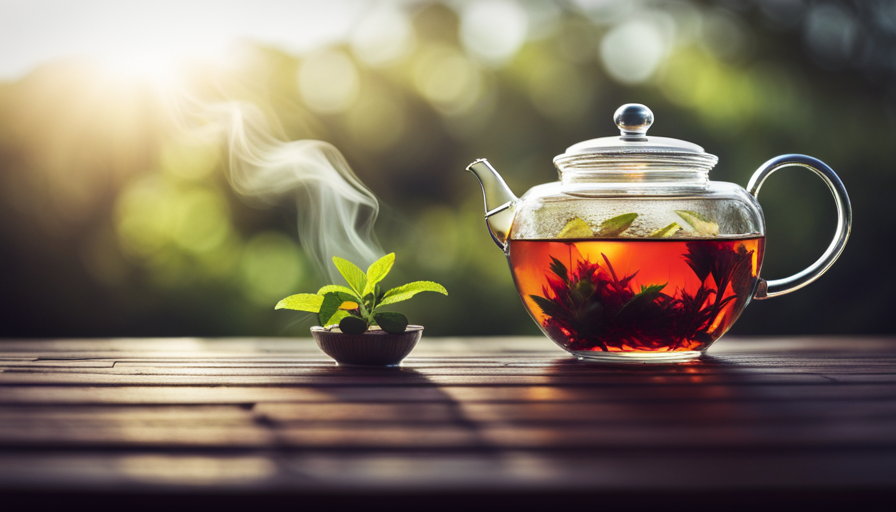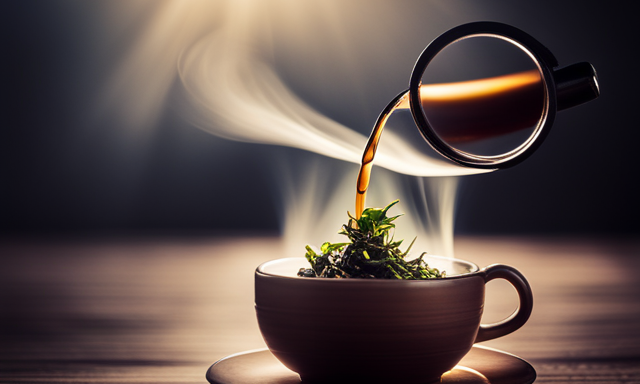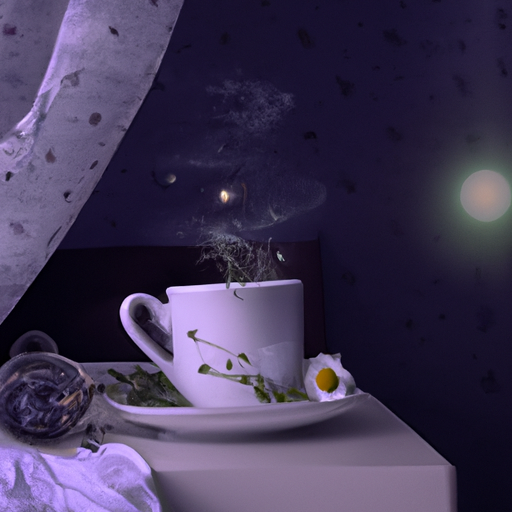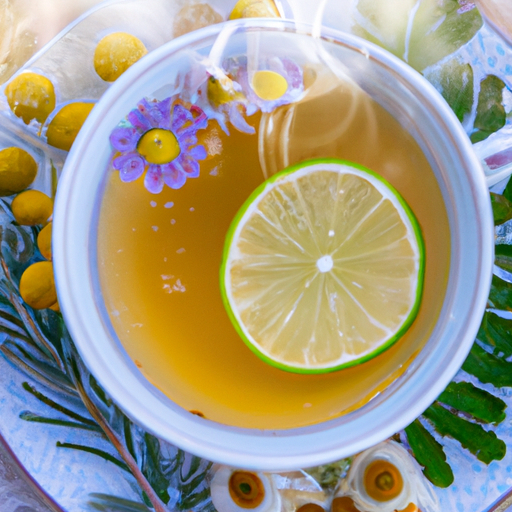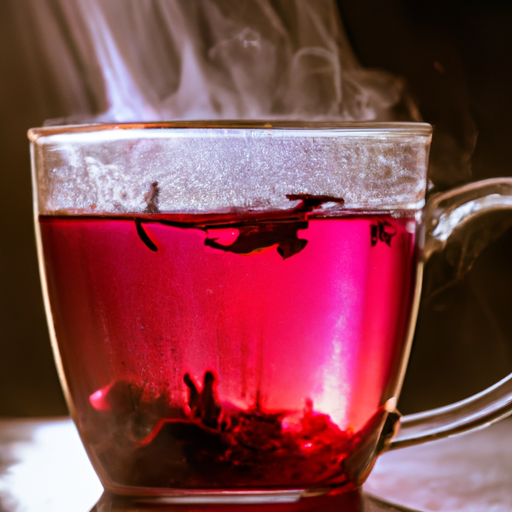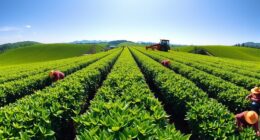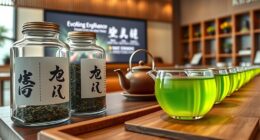Have you ever found yourself mesmerized by the enchanting sight of steam swirling from a hot cup of herbal tea? The fragrant vapors gently beckoning your senses, offering a peaceful moment amidst the hectic day.
As a tea enthusiast, I understand the importance of achieving the perfect brew, where every sip is a harmonious symphony of flavors. But how long should one steep herbal tea to unlock its full potential?
In this article, we will delve into the art of brewing herbal tea, unraveling the secrets to extracting the optimal flavors and aromas from a variety of herbal blends. From the different types of herbal tea to choosing the right temperature and steeping times, we will explore the nuances that can elevate your tea-drinking experience to new heights.
Join me on this journey as we uncover the mysteries of brewing herbal tea, experimenting with blends, and discovering techniques to enhance the flavors. Get ready to savor every sip, as we embark on a quest to brew the perfect cup of herbal tea.
Key Takeaways
- Different types of herbal tea require different steeping times, with most herbal teas requiring 5-7 minutes of steeping.
- Water temperature for brewing herbal tea should be between 170°F and 190°F, with lower temperatures for delicate floral herbs and higher temperatures for robust herbs.
- Adjusting steeping times allows for customization of the flavor profile, with shorter steeping times resulting in a lighter flavor and longer steeping times creating a stronger flavor.
- Different brewing methods for herbal tea include simmering, steeping, cold brewing, infusion bags, and teapot brewing, each offering unique benefits and flavors.
Types of Herbal Tea
Did you know there are various types of herbal tea to choose from? Herbal tea isn’t just delicious but also offers a wide range of health benefits. From calming chamomile to invigorating peppermint, there’s a herbal tea for every mood and occasion.
One of the greatest things about herbal tea is that it can be easily customized to suit your preferences. Whether you prefer a soothing blend to help you relax or a zesty infusion to wake you up in the morning, the possibilities are endless. You can even experiment with different herbal tea recipes to create unique flavors that suit your taste buds.
When it comes to herbal tea, the brewing time can vary depending on the type of tea you’re using. While some herbal teas require a longer steeping time to bring out their full flavor, others can be brewed quickly. It’s important to follow the instructions on the packaging or recipe to ensure you get the perfect cup of herbal tea every time.
Now, let’s move on to the next step – choosing the right temperature to brew your herbal tea.
Choosing the Right Temperature
Selecting the perfect temperature for steeping your favorite herbal infusion is like finding a needle in a haystack. The temperature at which you brew your herbal tea can greatly affect its flavor profile.
Different herbs require different temperatures to release their full potential, so it’s important to understand the impact of water temperature on herbal tea flavor.
When it comes to choosing the right brewing time, it’s crucial to consider the delicate nature of herbal teas. Most herbal infusions are best steeped at a lower temperature compared to black or green teas. This is because high temperatures can result in a bitter taste and destroy the delicate flavors of the herbs. Generally, a water temperature between 170°F (77°C) and 190°F (88°C) works well for most herbal teas.
The temperature you choose will also depend on the specific herbal blend you’re brewing. For example, delicate floral herbs like chamomile and lavender are best steeped at a slightly lower temperature, around 170°F (77°C). On the other hand, robust herbs like peppermint or ginger can handle a slightly higher temperature, closer to 190°F (88°C).
Understanding the impact of water temperature on herbal tea flavor is key to brewing the perfect cup. Now that you know how to choose the right temperature, let’s move on to the next step: steeping times for herbal teas.
Steeping Times for Herbal Teas
To ensure the optimal infusion, you’ll want to carefully consider the appropriate steeping times for your chosen herbal blend. Steeping times can vary depending on the type of herbal tea you’re brewing, as different herbs release their flavors and health benefits at different rates.
Generally, herbal teas require a longer steeping time compared to other types of tea. This is because herbal teas are made from dried flowers, leaves, or roots, which need more time to fully infuse their flavors into the water.
For most herbal teas, a steeping time of 5-7 minutes is recommended. However, some herbal blends may require longer steeping times to fully extract their medicinal properties. For example, chamomile tea is often steeped for 10-15 minutes to release its calming and anti-inflammatory benefits. On the other hand, lighter herbal teas like mint or lemon verbena may only need 3-4 minutes of steeping to achieve a flavorful cup.
It’s important to note that steeping times can be adjusted according to personal preference. If you prefer a stronger flavor, you can steep the tea for a few minutes longer. Conversely, if you prefer a milder taste, you can decrease the steeping time. Adjusting the infusion time allows you to tailor the flavor profile of your herbal tea to suit your individual taste.
Transitioning into the subsequent section about adjusting steeping times for personal preference, it’s also worth exploring how different herbs can influence the taste and aroma of your tea.
Adjusting Steeping Times for Personal Preference
If you want to customize the flavor of your cup, you can easily tailor the steeping time to suit your taste preferences. Adjusting the flavor of herbal tea is all about finding the perfect balance between strength and subtlety. Steeping times can vary depending on the type of herbal tea and the desired taste.
For a lighter and more delicate flavor, you can steep the tea for a shorter amount of time. This will result in a milder taste with less intensity. On the other hand, if you prefer a stronger and more robust flavor, you can steep the tea for a longer duration. This will extract more of the herbal essence and create a bolder taste.
It’s important to note that adjusting the steeping time may also affect the color and aroma of the tea. Experimenting with different steeping times will allow you to find the perfect balance that suits your palate. With a few tweaks, you can create a cup of herbal tea that perfectly matches your preferences.
Moving on to brewing methods, let’s explore different techniques to enhance the flavor and aroma of your herbal tea.
Brewing Methods
Discovering various brewing methods can unlock a world of tantalizing flavors and captivating aromas for your favorite infusion. When it comes to brewing herbal tea, there are different techniques that can be employed to achieve the desired taste and strength. Here are five brewing methods to enhance your tea infusion experience:
-
Simmering: This method involves bringing water to a gentle simmer and adding the herbal tea. Simmering extracts the flavors slowly and is ideal for delicate herbs.
-
Steeping: Steeping is the most common method, where you pour hot water over the tea and let it steep for a designated time. This technique allows the flavors to infuse gradually, resulting in a well-rounded cup.
-
Cold brewing: Cold brewing involves steeping the tea leaves in cold water for an extended period, usually overnight. This method produces a smooth and refreshing infusion.
-
Infusion bags: Infusion bags are pre-packaged with herbal tea, making them convenient and mess-free. Simply place the bag in hot water and let it steep.
-
Teapot brewing: Using a teapot allows for more control over the brewing process. Measure the desired amount of herbs, pour hot water, and let it steep to perfection.
Understanding the different brewing techniques can help you create the perfect cup of herbal tea. As we move on to the next section about the importance of water quality, it’s essential to consider how the brewing method interacts with the water to enhance or diminish the flavors of your tea.
Importance of Water Quality
Crafting a truly exquisite cup of tea relies heavily on the quality of the water used in the brewing process. The importance of water quality cannot be overstated when it comes to brewing herbal tea.
One key aspect of water quality is water filtration. Using filtered water ensures that any impurities, such as chlorine or heavy metals, are removed, resulting in a cleaner and more flavorful cup of tea. Additionally, filtered water can enhance the health benefits of herbal tea by eliminating potential contaminants that may be present in tap water.
Water quality also plays a significant role in the taste of herbal tea. The mineral content and pH level of the water can affect the extraction of flavors from the tea leaves, ultimately impacting the overall taste. Using water with a neutral pH and moderate mineral content can help bring out the best flavors in herbal tea.
As we move into the next section about enhancing the flavor of herbal tea, it’s important to note that water quality is just one factor in creating a delightful cup of tea.
Enhancing the Flavor of Herbal Tea
After discussing the importance of water quality in brewing herbal tea, let’s move on to the next step: enhancing the flavor. As a tea enthusiast, I’ve learned a few tricks to bring out the best in every cup. By following these tips, you can elevate the aroma and enjoy the full range of health benefits that herbal tea has to offer.
-
Temperature: Adjusting the water temperature can greatly impact the flavor profile. Different herbal teas require different temperatures, so make sure to check the recommended brewing instructions.
-
Steeping Time: Steeping time also plays a crucial role in achieving the perfect cup of herbal tea. Longer steeping times usually result in a stronger flavor, but be careful not to overdo it, as some herbs can become bitter.
-
Adding Citrus: A squeeze of lemon or a dash of orange zest can add a refreshing twist to your herbal tea. Citrus fruits not only enhance the flavor but also provide a boost of vitamin C.
-
Sweeteners: If you prefer a sweeter cup, consider adding a natural sweetener like honey or stevia. These options are healthier alternatives to refined sugar.
By following these tips, you can create a personalized and flavorful cup of herbal tea. Now, let’s move on to the next section and learn about the best ways to store herbal tea.
Storing Herbal Tea
Now, let’s explore how to properly store your favorite herbal tea – how can you keep it fresh and flavorful for longer?
Storing herbal tea correctly is crucial to preserving its freshness and ensuring that it maintains its delightful taste.
The first step in storing herbal tea is to ensure that it’s kept in an airtight container. This’ll prevent any moisture or air from seeping in and causing the tea to lose its flavor.
Additionally, it’s important to store herbal tea away from direct sunlight and heat sources as they can degrade the tea’s quality. A cool, dark pantry or cupboard is an ideal location for storing herbal tea.
It’s also recommended to keep different varieties of herbal tea separate, as they may have distinct aromas that can mix if stored together.
By following these guidelines, you can prolong the shelf life of your herbal tea and enjoy its refreshing taste for a longer period.
Now, let’s move on to experimenting with different herbal tea blends and discovering new flavors to savor.
Experimenting with Herbal Tea Blends
When it comes to herbal tea, I love experimenting with different blends and flavors. Creating your own blends allows you to customize your tea to suit your taste preferences and health needs.
I enjoy trying unique combinations of herbs and spices to discover new and exciting flavors in my tea.
Creating Your Own Blends
To create your own unique blends, you’ll need to experiment with different combinations of herbs and discover the perfect flavor profile for your herbal tea. Creating homemade blends allows you to tailor the taste to your preferences and create unique flavors that you won’t find in store-bought teas.
Additionally, homemade blends offer various health benefits as you can choose specific herbs known for their medicinal properties. To get started, here are a few tips:
- Start with a base herb like chamomile or peppermint.
- Add complementary herbs like lavender or lemon balm for a soothing aroma.
- Experiment with spices like cinnamon or ginger to add warmth and depth.
- Don’t forget to consider the health benefits of each herb you choose.
Once you’ve created your own blends, you can start trying unique combinations to further enhance the flavors and benefits of your herbal tea.
Trying Unique Combinations
Creating your own blends allows you to unleash your creativity and discover unique flavor combinations that’ll surprise and delight your taste buds, leaving you craving for more.
Experimenting with different herbs and spices can result in truly one-of-a-kind tea blends that can’t be found anywhere else.
Not only is creating unique tea blends enjoyable, but it also offers numerous benefits for your health and well-being.
Herbal teas are known for their various health benefits, such as boosting the immune system, aiding digestion, and promoting relaxation.
By combining different herbs and spices, you can tailor your blends to target specific health concerns or simply to create a delightful and refreshing beverage.
Now that you have your own special blend, let’s move on to enjoying your perfect cup of herbal tea.
Enjoying Your Perfect Cup of Herbal Tea
Savoring the ideal cup of herbal tea is a delightful experience that can transport you to a state of pure relaxation and tranquility. Personalizing your tea experience is essential to achieving that perfect cup. Here are three key aspects to consider when enjoying your herbal tea:
-
Temperature: Brewing herbal tea at the right temperature ensures that you extract the maximum flavor and health benefits. Most herbal teas require boiling water, but delicate herbs like chamomile or lavender prefer slightly cooler water around 190°F (88°C) to preserve their delicate flavors.
-
Steeping Time: Each herbal tea has its own optimal steeping time. Generally, steeping for 5-7 minutes allows the herbs to release their full potential. However, some herbs, like mint or lemongrass, infuse quickly and can become bitter if steeped for too long. Adjusting the steeping time according to the tea type is key to achieving the desired taste.
-
Experimentation: Don’t be afraid to experiment with different combinations and ratios of herbs to create your own signature blend. Whether you prefer a soothing chamomile and lavender mix or a refreshing mint and lemon infusion, exploring and personalizing your tea can make the experience even more enjoyable.
Incorporating herbal tea into your daily routine not only offers a delightful sensory experience but also provides various health benefits. From boosting immunity to aiding digestion, herbal teas are a natural way to promote overall well-being. So indulge in the perfect cup of herbal tea and let its comforting warmth and soothing flavors envelop you in a moment of pure relaxation.
Frequently Asked Questions
Can I use the same steeping time for all types of herbal tea?
Adjusting steeping time is crucial when brewing different types of herbal tea. While it may be tempting to use the same steeping time for all varieties, this approach can lead to disappointing results.
Each type of herbal tea has its own unique flavors and properties that require specific brewing times to be fully extracted. By adjusting the steeping time, you can ensure that you’re getting the most out of each cup of tea and enjoying its full potential.
Does the water quality affect the taste of herbal tea?
Yes, the water quality can indeed affect the taste of herbal tea. The temperature of the water and the brewing techniques used are crucial factors in bringing out the best flavors.
Water that is too hard or has a strong taste can alter the delicate flavors of herbal tea. It is recommended to use filtered or spring water at the appropriate temperature, usually between 190-205°F, to ensure a clean and flavorful cup of herbal tea.
Can I adjust the steeping time to make the herbal tea stronger?
Yes, you can adjust the steeping time to make the herbal tea stronger. Steeping time directly affects the strength of herbal tea. If you want a stronger flavor, you can increase the steeping time.
However, be careful not to over-steep the tea, as it can result in a bitter taste. It’s best to experiment with different steeping times to find your desired level of strength. Adjusting steeping time is a simple and effective way to enhance the flavor of your herbal tea.
How should I store herbal tea to maintain its freshness?
Storing herbal tea properly is like putting it in a time capsule, preserving its freshness and flavor for future enjoyment. To maintain its quality, store herbal tea in an airtight container away from sunlight, moisture, and strong odors. Avoid using transparent containers as they can expose the tea to light. Additionally, keep the tea away from heat sources.
Following these storing techniques will ensure that your herbal tea stays fresh and delicious for a long time.
Are there any tips to enhance the flavor of herbal tea without adding sweeteners or milk?
To enhance the flavor of herbal tea without adding sweeteners or milk, there are several alternatives to consider. One option is to steep the tea for a longer period of time to extract more flavor from the herbs.
Another way is to experiment with different herbal combinations to create unique flavor profiles. Additionally, you can try adding a slice of citrus fruit or a sprig of fresh mint to enhance the taste.
These techniques can help you enjoy a flavorful cup of herbal tea without relying on sweeteners or milk.
Conclusion
In conclusion, brewing the perfect cup of herbal tea is an art form that requires patience and precision. Like a delicate dance, each type of herbal tea requires a specific steeping time and temperature to fully unlock its flavors and benefits.
By experimenting with different brewing methods and adjusting steeping times to suit your personal taste, you can create a symphony of flavors that will tantalize your senses.
So, grab your favorite mug, embrace the soothing aroma, and sip your way to a world of herbal tea bliss.

